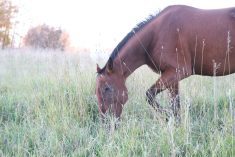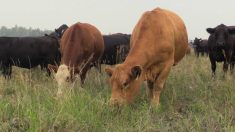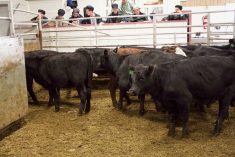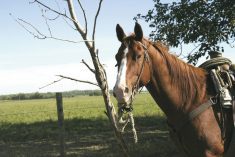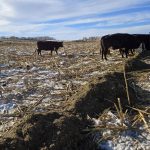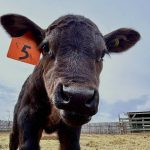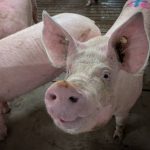Animal Justice has new weapons in its battle against the export of Canadian horses for slaughter.
The animal rights advocacy group has collaborated with another animal protection group in Japan called the Life Investigation Agency (LIA). The focus of the collaboration is to document what happens to horses once they reach Japan.
“It’s always been this missing piece,” said Kaitlyn Mitchell, Animal Justice director of legal advocacy.
Read Also

Manitoba Pork members vote in favour of levy hike
Manitoba Pork Council members have voted in favour of raising its per animal levy.
“We’ve been saying over and over again that the clock doesn’t stop when the plane lands, but we’ve never really been able to figure out what happens there. So we were happy when LIA reached out and really happy that we were able to work together.”
Why it matters: Animal rights groups in Canada have taken issue with the export of horses for meat, for which Japan is a major customer. Industry says arguments are based more on emotion than facts.
LIA and Animal Justice say they tracked four live horse shipments leaving Edmonton and destined for Japan between May 6 and June 17. They found that once the flights arrived in Japan, it would take between 4.33 and 6.5 hours for the animals to reach quarantine and the possibility of feed, water and rest.
Animal Justice says that if those times were averaged and combined with international transit and time on the Canadian side, roughly 60 per cent of horse shipments from Edmonton and all such flights from Winnipeg would exceed the upper time limit of what Canadian regulations allow for horses to go without feed, water and rest.
According to the CFIA, horses may be shipped without feed, water and rest for up to 28 hours. That interval starts when horses no longer have access to those, usually when they are loaded at the farm or feedlot before being trucked to the airport.
If horses are provided food, water and rest at any point during their transport, the window restarts. The interval continues until horses are provided with those elements at their destination country or another suitable stopover facility or airport.
Animal Justice has lodged a formal complaint with the CFIA based on its observations. It is calling for enforcement action to be taken in relation to the four tracked shipments and wants all horse exports for slaughter to stop until there are guarantees that all shipments will comply with the law.
“This new investigation appears to demonstrate a clear pattern of regulations being flagrantly ignored,” said Mitchell.
“We are urging the CFIA to look into this troubling situation and to halt all horse exports for slaughter until the industry can guarantee that the shipments will comply with Canadian animal transport laws.”
In an emailed statement, the CFIA said it is reviewing information provided by Animal Justice and any follow-up activities will be in accordance with the agency’s compliance and enforcement policy.
The CFIA doesn’t conduct inspections in Japan, but does require the exporter to provide a transportation plan that extends into Japan and includes off-loading from the aircraft and ground transport. However, Japanese authorities are ultimately responsible for regulatory oversight of animals transported within Japan.
If found in violation of the CFIA’s transport policy, consequences could include receipt of a non-compliance letter, fines or prosecution before the courts. The CFIA said it would publish a bulletin on its website for any case that led to formal charges.
Wider battle
This is the latest salvo in animal rights groups’ campaign against live horse exports for slaughter.
In February, Animal Justice launched a private prosecution against a Manitoba farmer after complaints to the CFIA that a shipment from the farm had exceeded food, water and rest rules did not result in enforcement action.
The Canadian Senate this fall will also debate Bill-C-355, a private member’s bill to ban air export of live horses for slaughter.






